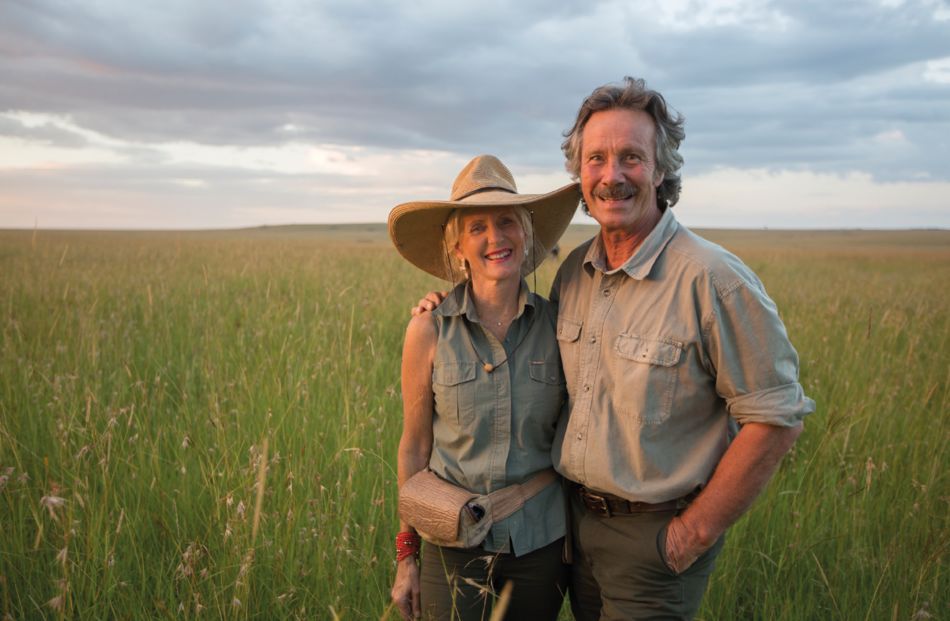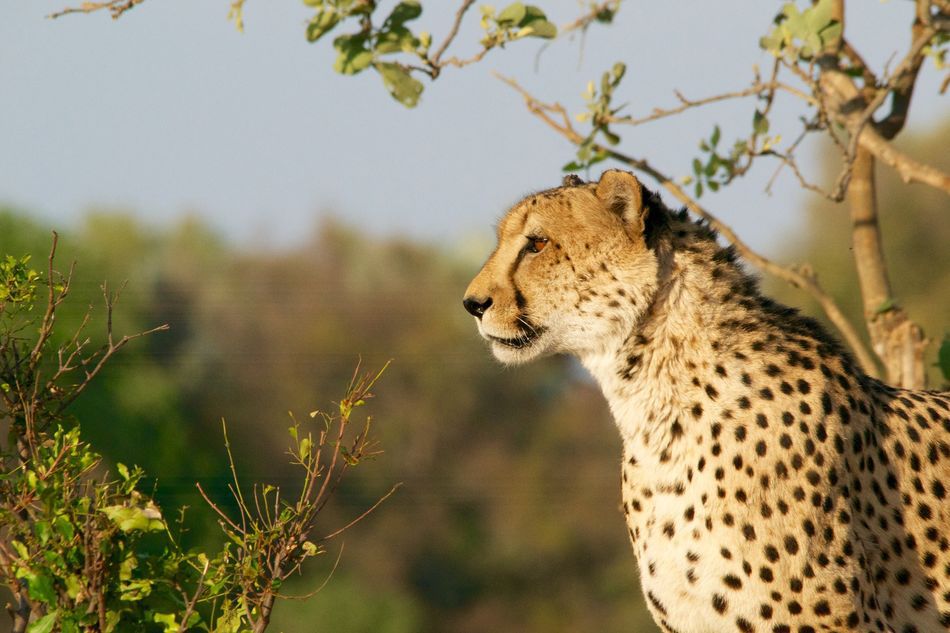Article content
2 November 2016 by Amy Sohanpaul
This article originally appeared in Traveller magazine.
Jonathan Scott sweeps into the Traveller offices from time to time, always just in from Africa. With him he brings the suggestion of red dust and a hint of the wild, stories from the savannah of lions and leopards. He is based mostly in the Masai Mara, but also in Nairobi, in a house from where he and his beloved wife Angie look out towards the blue-ridged folds of the Ngong Hills, immortalised by Karen Blixen in Out of Africa. Nairobi is the city of my childhood, so I hang on to his every word of reports from that crazed city, updates on the new pavement cafes, the old bars where people still spend all day, the whirlygig politics, always changing, always the same.
But it’s not a shared sense of place that makes Jonathan’s stories so compelling. He’s a man of infectious enthusiasm, vision and compassion, and never fails to inspire. He spoke a few years ago at the Travellers’ Tales Festival, organised at the Royal Geographical Society by myself and Traveller’s last editor, Jonathan Lorie. The speakers were many and varied, all the great and good travel writers and photographers. When Jonathan and Angie arrived, the whole feel-good factor of the event felt even better. Many of the attendees were there to explore the idea of a career in travel writing or photography, alluring but notoriously difficult fields to make a living in. With great warmth, he made every person there feel they could do anything at all.

Jonathan Scott and his wife, Angie
One reason for this might relate to the beginnings of his own career. As he came to the end of his zoology degree in Ireland, his professor asked, ‘OK Jonathan, what next?’ Jonathan said he wanted to do something involving wildlife. ‘Do you have a private income?’ the professor replied. Today Jonathan smiles as he recounts the memory: ‘What he was really saying to me was – you’d better be like the rest of us. Natural history is a pastime, not a career.’
We’re chatting in the sunshine outside a London pub, and although he’s comfortable wherever he is, he looks slightly out of place street-side in urban Britain. That may be because we see him as the man in the Mara, presenter of the popular BBC TV series Big Cat Diary, living with lions, finding leopards, ducking as a cheetah perches on the roof of his Land Rover.
But he shouldn’t seem at odds with London, just because he has that bronzed look of Africa about him now. His childhood was solidly, stolidly English and he loved it. “My mum and dad lived in London. My dad was an architect who served with distinction during the war. He came back having survived that, and blow me if he hadn’t died within a couple of years of a brain tumour, at the age of 42.
‘You can imagine the joy, two little kids born after my dad came back from the war. Then suddenly he’s gone, dead from a brain tumour.
‘He had bought a little farm in Berkshire and had always dreamed of retiring there. So my mum, knowing he would have wanted his kids to grow up in the countryside, to be close to nature, sold the place in London and took us to the farm. We were brought up on there and that’s where I discovered the wonder of nature.
‘I was inseparable from my sister Caroline. We would constantly be exploring the fields and hedgerows and forests. We’d see hares, we’d see stoats, we’d see badgers and foxes. And I just loved it, loved natural history.
‘I collected cigarette cards of Peter Scott’s paintings of British wildlife, every copy of Animals magazine since it came out in 1963, I sat in the cinema and watched Born Free, Joy and George Adamson releasing Elsa the lioness into the wild in Kenya. And I knew I wanted do something with wildlife.’
Which takes us back to that discouraging professor. And Jonathan’s driving-seat personality, which involved pursuing his long held dream. ‘I had always dreamt of going to Africa. I joined an overland trip – two Bedford trucks leaving London for Johannesburg. The Sahara, West Africa, the rainforests of Central Africa, and when we got to East Africa, that’s when I thought – “Bingo, this is it!” East Africa was the Africa I had fallen in love with, that I’d seen on television. It’s special.’

Jonathan arrived in South Africa at the end of those four months on the road. It was here, in the mid-70s, that he immersed himself in the art of drawing wildlife. His father had been a talented artist and Jonathan, who had always been able to draw, started to visit the many galleries in Johannesburg to hone his own technique. He continued to work on this in Botswana, his next stop, where he spent time on a houseboat with Tim Liversedge and his wife June. Tim was a naturalist and photographer, his wife a cordon bleu cook, and together they hosted visitors who wanted the wildlife experience up close.
It was a hint, for Jonathan, that it might be possible to make a living following passions and dreams. Back in Kenya, bit by bit, he realised that dream. His drawings funded him some of the way, a chance invitation to act as the in-house naturalist at the Mara River Camp did the rest. He had no wages, but the thrill of being in the bush, close to big cats, was recompense enough. His autobiography, The Big Cat Man, is not only full of his exquisite illustrations of wildlife big and small, and bonkers episodes and encounters with larger-than-life people as well as animals, it is also suffused with a sense of gratitude – and of coming home.
Two turning points followed – the sort that happen when you are in the right place for you, doing the right thing for you, at the right time. The first was that the BBC were in the Mara looking for someone to present its animals in a different way, particularly the big cats that Jonathan had drawn and studied in intimate detail. This led to Big Cat Diary fame.
The second was meeting his wife Angie, who had been brought up in Africa herself, in Tanzania. There is no conversation with Jonathan that doesn’t involve Angie. Seeing them together is like watching a Hollywood rom-com, but in a genuine way: it’s a love affair suited to the epic landscapes they inhabit. And there’s something about Angie, apart from the obvious good looks: an infinite kindness. They married in the Mara in 1992.

Together they built a success, with Angie quietly doing those less exciting but so necessary things – embracing new technology, making sure that as the world of photography zoomed from film to digital, from small photo agencies to huge libraries that they would be able to carry on taking the images they believed in. And she has become an outstanding wildlife photographer in her own right: they are the only couple to have both won the Wildlife Photographer of the Year Competition, Jonathan in 1987, Angie in 2002.
A few years ago, during one of his visits to London, Jonathan was, for the first time, a bit distracted. It turned out that Angie was facing serious surgery for a cranial aneurism. It’s described in his searingly honest autobiography – the hours waiting for her to come out of the theatre, the not knowing, and the blessed reprieve: ‘I fell to my knees and sobbed from a place so deep inside me that I was beyond words to describe my relief and elation.’
After that, they both came back to what they do best – capturing wildlife in a way that catches the imagination, and inspiring people in the way their documentaries and lectures do, in a painstakingly gorgeous wildlife photography book, Sacred Nature.
‘This is what Angie and I really want to do, this is our mission, with Sacred Nature, Angie’s brainchild. With that book, we want to inspire people. Not necessarily to do something with wildlife, but that you can do things as a couple, you can have a relationship and a career following a dream. Or – and this we find important, that if you’re young and it’s hard – you don’t give up. I failed the exam to get into my first school, Christ’s Hospital, a wonderful school, my dad went there, my sister was there, my godfather went there. But I got another chance at it and did get there. Because what you do in life will be about determination to get to your goal.
‘And if you believe that, and don’t let other people put you off – because they don’t always have your deeper, best interests at heart – it will work out. I met people who used to say – “You’re not a very good photographer, you’ll never make it.” And that professor said – “There are no careers out there for people wanting to work with wildlife, just hobbies.”
‘Don’t be put off by what other people say. If you are going to step back or give up, you be the one to decide that. Don’t be the 50-year-old or even the 30-year-old who is sitting thinking – “I would have loved to have done that. That’s what I should have done.” Don’t do any of that. Go and do it. Want to be a pilot? Take the exam. Work hard. You’ll manage it. You want to become a photographer? Become one. Even if you just take your iPhone out and start shooting: start.
‘And do you know what, many years later, after that professor’s dispiriting words, one of the lecturers from that university wrote to me and said, “I’m so glad you didn’t follow our advice.”






